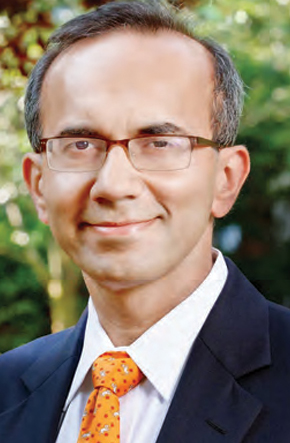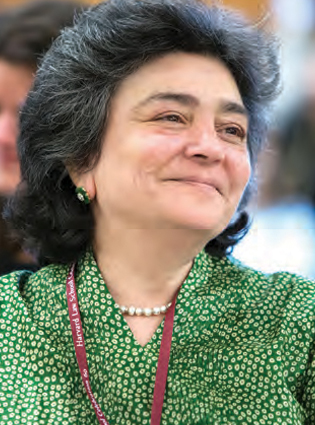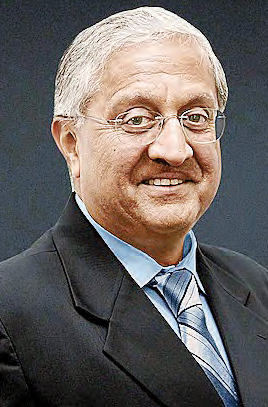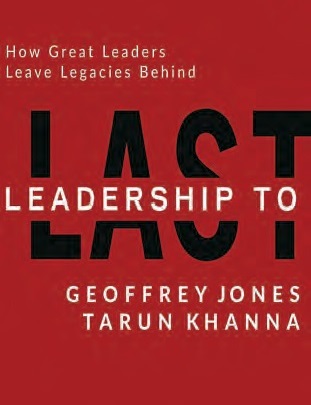Inspiring Leadership that Lasts

A recent session of Tata Literature Live! Business Shastras featured another remarkable book from the world of business-Leader-ship to Last: How Great Leaders Leave Legacies Behind-written by Tarun Khanna and Geoffrey Jones, both reputed professors at Harvard Business School. The book features interviews with India’s distinguished leaders who have proven long-term leadership to last. These interviews lay forth the opportunities and difficulties of the present and the future, encapsulating the history of recent decades. Tarun Khanna, co-author of the book and Professor, Harvard Business School, joined by Zia Mody, Corporate Lawyer, Managing Partner, AZB & Partners. The conversation was led by R. Gopalakrishnan, Writer, Corporate Advisor, and Former Executive Director, Tata Sons
"Sitting here at the Harvard Business School, we are lucky to have a lot of talented, ambitious students that pass through. The hottest thing in the last 10-15 years is ‘I’m going to be an entrepreneur’ or ‘I’m going to build a company and it’s going to be a unicorn, or a super unicorn’"
-Tarun Khanna
R Gopalakrishnan: Your book is organised in an innovative way. It consists of seven chapters starting with Managing Families, Committing to Values, Innovation, Contesting Corruption, Challenging Gender Stereotypes, Promoting Inclusion, and Creating Value Responsibly. Within these slices, so to speak, spices and seasonings have been added via interviews with different people. What was the purpose of this arrangement?

Tarun Khanna: Collaborating with Geoffrey Jones, the reason for writing the book is primarily to draw attention to the stories but as much to draw attention to the underlying resource, which is completely free and everybody should use it. It’s literally hundreds of hours of the original video, of people speaking very candidly about the arc of their careers, as Zia Mody did very kindly with me.
The innovation which we are showing is that we can learn from a collage of responses from different men and women from across 20–25 countries. About a third of our interviews are from South Asia-India, Pakistan, Bangladesh, Sri Lanka, Nepal. This book is written for the Indian audience; we have over-weighted on Indian and some South Asian examples. The intent is to produce a similar one for Latin America and Africa because we find people in these societies want to learn from those who have emerged from similar milieus as them, but they are also open to relating it to other people from other similar geographies. Let’s say, what Zia is doing in contesting gender stereotypes, which is similar to somebody in Brazil or in South Africa or Pakistan. Seema Aziz in Pakistan has done some amazing work with women and schooling. We want readers to hear it straight from the proverbial horses’ mouths so there are actual excerpts from the transcripts of video interviews we did with these people.
Our contribution is primarily to create the library of over 10 years, and to continue to do that. We had almost 25 Harvard faculties collaborate in producing the archive, and then to curate this little assemblage that we are putting forward for people’s consumption, edification and hopefully, even enjoyment.
Zia, it blew my mind to know that you are now 400 lawyers at AZB & Partners, and 50% of them are women. It must have taken grit and determination to build that...
Zia Mody: I was the eldest child, with three brothers coming after me, so, I had the top slot in terms of initial attention. A lot of it had to do with how we were brought up. Being a Bah’ai by religion-my mother was also a Bah’ai-one of our 10 commandments is equality between men and women. My poor father, who was not a Bah’ai, had no choice but to fall in line. When you grow up not having that mental block, when you go into a courtroom-as I have narrated-in the early years, I was quite stunned to see I was one of two or three women. But you learn to get over that. In the firm now, we are nearly 500 since Tarun wrote the book but the real issue is understanding what women need. It’s not so difficult. Men are increasingly getting the plot. For me, it is the man who will really bring about change. A few women are in the C-Suite but it’s largely still men, and if we don’t have male champions this can’t really become institutionalised. It’s all about communication, understanding what their pain points are. In this age, where talent is at a premium, we should be encouraging women to ask what they need to stay with us. One of the biggest asset classes that have been hit by Covid is women. They have gone out of the employment pipeline even more.
"A few women are in the C-Suite but it’s largely still men, and if we don’t have male champions this can’t really become institutionalised. It’s all about communication, understanding what their pain points are"
-Zia Mody
Tell us a little about your experience with failure, the first time you lost in court...

Zia: As I shared in the chapter, I came back from America to a totally different world; it was almost Dickensian. I was sitting in a very posh Manhattan office at Baker & McKenzie, and came back to the court in Bombay where you shared a desk of around 4ft. with my senior, with very small space literally to read my papers. I used to work really hard, mainly because I was completely blown away by the fact that I was one of the less than five women who would have to open her mouth; the courtroom would have a hundred male lawyers looking at me, and I was paranoid that I would make a mistake. So, I would over-prepare. In this one case, I thought I had a really good case and I was devastated when I lost. I was convinced that the propositions I was putting forward were right but I lost. Very weepy, I spoke to my father who was also a lawyer, and must have won and lost hundreds of cases in his life. He listened to me very sympathetically on the phone from Delhi, and I could imagine the amusement on his face when he said, “But darling, somebody has to lose but don’t worry, the client will appeal, and when you appeal, you argue first, so you make your point to the judge, and the appeal court will hear you.” That gave me a little solace at that time. As I grew older into the profession, I realised that you can lose, sometimes you might deserve to lose and sometimes you may not but it’s never a total loss because you always have the option to prove yourself going forward. My father taught me not to go overboard about it, gave me the next step which was a possible solution, and again challenged me to prove my skill set by winning in the appeal.
"To create institutions, we need to strengthen the foundations continually and inexorably on health and education"
-Tarun Khanna
Tarun, how did you decide on the choice of leaders and the legacy they are leaving behind?
Tarun: Sitting here at the Harvard Business School, we are lucky to have a lot of talented, ambitious students that pass through. The hottest thing in the last 10-15 years is ‘I’m going to be an entrepreneur’ or ‘I’m going to build a company and it’s going to be a unicorn, or a super unicorn’. Then they take them public, and they become gazillionaires, and they’re very happy...and then very often it crashes. ‘Leadership to Last’ is the distinguishing feature here. Our selection criteria was incredibly simple: organisations that had been around for decades, had a stable purpose, were respected, and were recognised by people on the street. We then engaged them in a free-flowing conversation, which was recorded, edited and saved on our website. Anyone can access it, it’s the Creating Emerging Markets website at Harvard Business School. The idea is to broaden the repertoire of exemplars from whom we can extrapolate lessons.
When we educate people in the social sciences, in the professions, in America, our primary examples are American and to some extent European. You and I know that there are plenty of examples of creativity all over the world. The reason that people don’t access these, and learn from them, and engage with them is because it’s not easy to do as the stories are not available; they are not immediately accessible the way you could find something on Mr Gates or Mr Musk.
"The book is organised in an innovative way. It consists of seven chapters-within these slices, spices and seasonings have been added via interviews with different people"
-R. Gopalakrishnan
Are there ways in which the leaders of today have reconciled contrasting views and moved their company forward?

Tarun: In the history that European traveller Alexis de Tocqueville wrote while he travelled across America, he was impressed at the entrepreneurship, creativity, and freedom there. Contemporary historian Howard Zinn, writing about the same time hundreds of years later, basically looked at the same data, and reached the opposite conclusion: that the people’s history of America was the exclusion of many to benefit the few.
We are seeing a lot of it nowadays; in America, it’s going under the acronym DEI (Diversity, Equity and Inclusion). It says let’s have diverse points of view across the table for anything, have more women in the workspace. A paper written by a young colleague at Harvard, shows that whenever women are less involved in the production of ideas, whether in R&D or the production process in companies, you demonstrably get less output that has anything to do with women’s welfare.
Zia: Leaders use the data available to them at that point in time and in history, and make their decisions. Being in court, I have learnt that there is always a middle path that you arrive at which takes the narrative forward. If leaders are unwavering in their point of view and stubborn, they lose the ability to navigate. And that is not leadership. It’s basically being able to dance and prance across the data, slice it and dice it in a way that works for the moment and the problem statement at that time. What I have learnt is not just women and men but across the board, leadership is about recognising other points of view, being able to say sorry genuinely, retrace and come back after having learnt from mistakes and licked your wounds in private.
There is no doubt that India needs more big institutional enterprises. Any thoughts on how India can do that?

Tarun: I think we need to educate-playfully-our children. We need to imbibe in them early on a sense of curiosity and play in learning, so it’s not a drag. Learning in India is a drag. It’s overly draconian and not particularly inspiring. It’s not only about legal right to education-there’s many a slip twixt the cup and the lip. Another thing which I am very distressed about...Kiran Mazumdar-Shaw and I are two of the co-chairs of the Lancet Citizens Commission on Reimagining India’s Health System. Lancet is a leading health journal from the UK. It’s kind of shocking that after Covid, in our recent budget, our allocation as a society to health is minuscule. While there are healthcare titans profiled in the book who have done their bit, as a society, health is not a voter concern. It’s treated as an expenditure on the national income statement and not as an asset class in the balance sheet. That mindset is just backwards. To create institutions, we need to strengthen the foundations continually and inexorably on health and education.
Zia: In Tarun’s foreword, he writes that everything should be founded ultimately on lasting institutional change. I like the phrase you use-“not episodes of individual CEOs as saviours” and that history matters. As a country, we still need to walk that journey. All our great houses which have institutionalised have started with that saviour of a CEO. But the most important thing is the mindset, the value, and the culture that he commands and controls for a sufficiently long period of time. And hopefully the ‘he’ will become a ‘she’ in some cases.